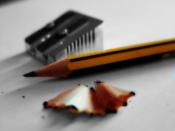Knowing that you have taken a philosophy course, someone asks you the question, "but how do you KNOW that something is true and real?" Rather than being trapped into an "answer," be smart and give the person some alternative ways of "KNOWING." Mention the philosophers in Chapter 5 as you talk about their theories as you try to convince your friend that they have something valid to offer.
You ask, "How do you KNOW that something is true and real". Well that would depend on how you perceive something to be true and real. Just because you can see an apple, is it sufficient to believe that it is true and real. Again, it would depend on how you define true and real. You might say that, just because you can "see" something, it makes it true and real. So, in other words, you depend on your sensory perceptions to verify the "realness" of something.
In that case, you will fall in the empiricist category of Locke, Berkeley, and Hume, of which they were a part. Or you might like to depend on reason more than perception to verify something's existence, so you would be along the general lines of Descartes. Or you might like to depend on both rationalism, and empiricism, and agree more with Kant.
Locke argued that we use our senses to acquire knowledge. If you agree with Locke, you would agree that the objects have certain intrinsic distinct qualities that are different from our perception, called primary qualities, and that objects are capable of existing outside of us. Therefore, we can use our senses, to experience some of their primary qualities. Therefore our senses certify that things outside the self exist, and provide and accurate picture of those objects (Pg 370 7th edition).



Good knowledge
The essay gives us the philosophy about how to believe something.
The explaination of Descartes' view is not very clear. What's the "Outside Force" indicating? Why you use God here? You want to tell us God's words are believable here?
4 out of 4 people found this comment useful.